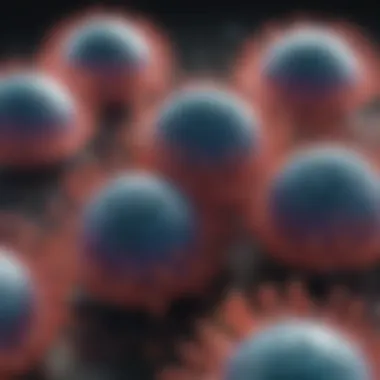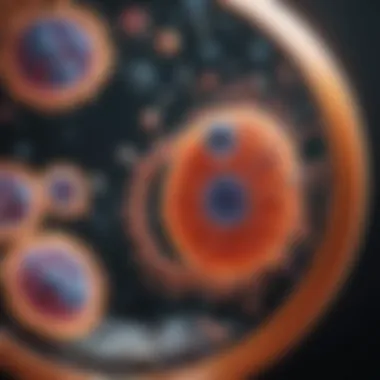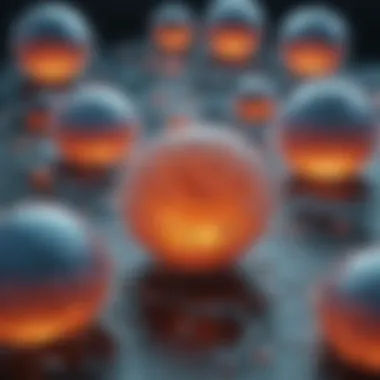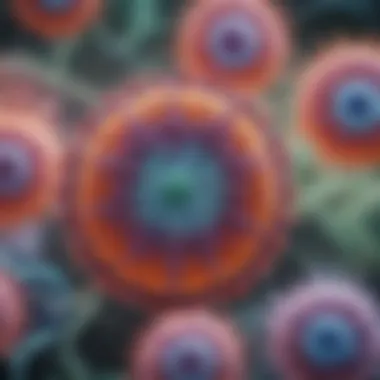The Impact of HeLa Cells Unveiled: Insights from Compelling Book Summaries


Book Title and Author Introduction
In this section, let's examine the book 'Unveiling the Impact of He La Cells: Insights from Book Summaries' authored by a prominent writer well-versed in scientific literature. The author provides a comprehensive analysis of HeLa cells, offering a unique perspective on their impact. Through this book, readers are exposed to the author's deep understanding of the subject matter, shedding light on the key themes that drive the narrative forward with an exceptional level of insight.
Summary of Book Content
The book delves into the intricacies of He La cells, exploring their profound impact on various scientific disciplines. It offers a concise yet detailed summary of the main points covered, encapsulating the essence of HeLa cells' significance. Throughout the text, readers encounter compelling quotes and passages that serve as beacons of knowledge, guiding them through the complex world of cellular biology and medical research.
Three Lessons Learned
Lesson 1: The first lesson extracted from the book revolves around the historical significance of He La cells and their transformative impact on medical research. The author expertly highlights how these cells have revolutionized our understanding of human biology and disease.
Lesson 2: Moving forward, the second lesson delves into the ethical considerations surrounding the use of He La cells. Readers are urged to contemplate the moral implications of cell research and the boundaries that define scientific discovery.
Lesson 3: The final lesson uncovers the societal implications of He La cells, emphasizing their role in shaping healthcare policies and advancing medical innovations. Through this lesson, readers gain a deeper appreciation for the wider implications of cellular research.
Practical Applications
For real-life application, the lessons learned from the book can be implemented in various scenarios, from healthcare decision-making to bioethical dilemmas. By understanding the principles discussed in the book, readers are equipped with the knowledge to navigate complex scientific and ethical landscapes.
Introduction to HeLa Cells
He La cells, originating from the cervical cancer cells of Henrietta Lacks, have revolutionized biomedical research and transformed our understanding of cell biology. In this comprehensive article, we delve deep into the world of HeLa cells, exploring their pivotal role in scientific discoveries and medical advancements. By examining the unique characteristics of HeLa cells, we can unravel the profound impact they have had on various fields.
Discovery of HeLa Cells
HeLa Cells: The Origin Story
He La cells' origin story stems from Henrietta Lacks, whose cells were unknowingly taken and became the first immortal human cells cultured in a laboratory setting. This historical event sparked a wave of groundbreaking research and paved the way for unprecedented discoveries in medicine and science. The story of HeLa cells' discovery is a testament to human ingenuity and the serendipitous nature of scientific breakthroughs.
Pioneering Research on He La Cells Pioneering research on He La cells encompasses the extensive exploration of these unique cells in vitro, leading to insights into cell behavior, disease mechanisms, and potential treatment avenues. Researchers worldwide have conducted pioneering studies using HeLa cells, contributing significantly to our knowledge of cellular biology and disease pathophysiology. The invaluable data obtained from studying HeLa cells continues to shape modern medicine and propel scientific advancements.
Unique Characteristics of He
La Cells


Immortality of HeLa Cells
One of the most remarkable features of He La cells is their immortal nature, defying the typical cell lifespan and enabling continuous division and growth. This inherent property has made HeLa cells indispensable in long-term experiments, drug testing, and research requiring sustained cellular activity. The immortality of HeLa cells offers researchers a stable, reproducible model for studying various biological processes and investigating novel therapies.
Contribution to Biomedical Research
He La cells have made significant contributions to biomedical research by serving as a reliable and versatile tool for studying human cellular behavior. Their adaptability to different experimental conditions, genetic manipulations, and culture environments has facilitated numerous breakthroughs in areas such as cancer research, virology, and drug screening. The unparalleled contribution of HeLa cells to advancing our understanding of diseases and treatment modalities underscores their irreplaceable role in scientific investigations.
Impact of He
La Cells in Medicine
He La cells have left an indelible mark on the landscape of medical research, revolutionizing various aspects of the field. Their impact in medicine is profound and multifaceted, shaping the way we understand and approach healthcare. By delving into the intricate world of HeLa cells in medicine, we unravel a tapestry of discoveries, challenges, and ethical considerations that have defined modern healthcare practices.
Revolutionizing Medical Research
He
La Cells and Vaccine Development
He La cells play a pivotal role in vaccine development, serving as essential tools in the quest to combat infectious diseases. With their unique ability to proliferate indefinitely, HeLa cells offer researchers a consistent and reproducible platform for testing vaccine efficacy and safety. This characteristic makes HeLa cells a cornerstone in the development and optimization of vaccines, allowing for accelerated and precise vaccine production to address emerging health threats effectively.
Applications in Cancer Studies
The utilization of He La cells in cancer studies has yielded groundbreaking insights into the molecular mechanisms of cancer progression and treatment. HeLa cells provide a robust model for studying the genetic alterations that drive tumorigenesis, offering researchers a glimpse into the complex interplay between cancer cells and their microenvironment. Through applications in cancer studies, HeLa cells have facilitated the development of novel therapeutic strategies and personalized treatment approaches, revolutionizing the way we combat cancer.
Ethical Controversies
Privacy Concerns Surrounding He
La Cells
Privacy concerns have surrounded the use of He La cells since their inception, raising questions about consent, control, and ownership of biological materials. The immortal nature of HeLa cells has sparked debates regarding patient confidentiality and the rights of individuals whose cells are used without their explicit permission. Balancing the benefits of research with the ethical implications of privacy invasion continues to be a complex issue in the realm of HeLa cell research.
Impact on Informed Consent


The impact of He La cells on informed consent practices has reshaped the ethical landscape of biomedical research, highlighting the need for transparent and comprehensive consent protocols. The unique challenges posed by the immortalization of HeLa cells have underscored the importance of ensuring that patients are fully informed about the potential uses of their biological samples. Exploring the intricate dynamics of informed consent in the context of HeLa cell research reveals a nuanced interplay between scientific advancement and ethical responsibilities.
HeLa Cells Beyond Medicine
He La cells, originating from the cervical cancer cells of Henrietta Lacks, have transcended their medical origins to make significant contributions in diverse fields beyond medicine. These remarkable cells have opened new avenues in scientific exploration, pioneering breakthroughs that extend far beyond traditional biomedical research. By venturing into the realm of non-medical disciplines, HeLa cells have reshaped our understanding of the scientific landscape and expanded the horizons of human knowledge.
Contribution to Science and Research
He
La Cells in Space Exploration He La cells have played an instrumental role in space exploration, offering scientists a unique platform to study cellular behavior in extraterrestrial environments. Their resilience and adaptability have made them invaluable tools in unraveling the mysteries of how living organisms respond to space conditions. This not only enhances our comprehension of human physiology in space but also provides insights into potential long-duration space missions and planetary colonization endeavors. Despite certain limitations, such as the ethical considerations of conducting experiments in space, HeLa cells remain indispensable in advancing our understanding of the universe.
Genetic Studies Using He
La Cells In the realm of genetic studies, He La cells have revolutionized research methodologies, serving as crucial components in unraveling the complexities of the human genome. Their unique genomic profile offers scientists a diverse genetic resource, enabling in-depth exploration of hereditary conditions, developmental pathways, and therapeutic interventions. The unparalleled replicative ability of HeLa cells ensures a stable genetic model for continuous experimentation, propelling genetic research into uncharted territory. However, ethical concerns regarding consent and equity in genomic studies highlight the ongoing ethical debates surrounding the use of HeLa cells in genetic research.
Cultural Influence of He
La Cells He La cells have not only impacted the scientific community but have also made profound cultural impressions, becoming subjects of literature and popular culture. Their intricate connection to human experiences and societal reflections have permeated various artistic expressions, enriching the cultural tapestry with themes of life, death, and ethical considerations. Through the exploration of HeLa cells in literature and popular culture, a deeper narrative unfolds, intertwining scientific achievements with profound moral dilemmas and societal introspection.
HeLa Cells in Literature
He La cells have inspired literary works that delve into the ethical complexities and human stories surrounding their discovery and utilization in research. By exploring the emotional and ethical dimensions of HeLa cells through literature, authors provide a nuanced perspective on the intertwined nature of science and humanity. This literature not only educates readers on the scientific significance of HeLa cells but also challenges societal norms and perspectives on medical ethics.
He
La Cells in Popular Culture In popular culture, He La cells have become symbols of scientific advancement and ethical debates, influencing artistic expressions in various forms. Their presence in films, music, and other media signifies the enduring impact of HeLa cells on society's collective consciousness. Despite the oversimplification or dramatization often present in popular culture representations, the portrayal of HeLa cells serves as a potent reminder of the ethical considerations inherent in scientific progress and medical research.
Book Summaries on He
La Cells
In this article, the focus shifts to the critical examination of He La Cells through the lens of book summaries, providing a unique and insightful perspective on the impact and relevance of this remarkable cell line. By exploring diverse literary works that center around HeLa cells, readers are offered a curated collection that sheds light on their significance in medicine, science, ethics, and culture. The utilization of book summaries adds a layer of depth and analysis, enabling a holistic understanding of the multifaceted implications of HeLa cells across various fields.
He


La Cells: A Journey Through Literature
Insights from 'The Immortal Life of Henrietta Lacks'
Diving into 'The Immortal Life of Henrietta Lacks' allows readers to unravel the compelling narrative of Henrietta Lacks and the ethical issues surrounding the immortalization of her cells. This book not only delves into the scientific impact of He La cells but also explores themes of consent, racism, and medical ethics. The detailed exploration of Henrietta Lack's life story and the legacy of her cells provides a comprehensive view of the complex interplay between science and human rights. 'The Immortal Life of Henrietta Lacks' stands out as a poignant and thought-provoking choice for this article, offering profound insights into the ethical dilemmas posed by the use of HeLa cells in research.
Key Takeaways from 'The Immortal Cell'
In 'The Immortal Cell,' readers encounter a different perspective on He La cells, focusing on the broader implications of immortal cell lines in scientific research. Through key takeaways from this literary work, readers gain a nuanced understanding of the far-reaching impact of HeLa cells beyond the confines of traditional medical narratives. This book complements 'The Immortal Life of Henrietta Lacks' by expanding the discourse on immortal cell lines and their implications for future research and ethical considerations. Its inclusion in this article enriches the discussion by highlighting the extended implications of HeLa cells in advancing scientific knowledge and ethical discourse.
Lessons from HeLa Cells
Moral Dilemmas Raised by He
La Cells
Exploring the moral dilemmas raised by He La cells exposes readers to the ethical complexities inherent in biomedical research. The use of Henrietta Lacks' cells without her knowledge or consent raises questions about patient autonomy, confidentiality, and the commercialization of biological materials. By delving into the moral quandaries surrounding HeLa cells, readers are prompted to reflect on the broader ethical considerations in biomedical research and the importance of informed consent in scientific endeavors. Examining these dilemmas offers a critical lens through which to assess the ethical responsibilities of researchers and the implications of immortal cell lines in medical advancements.
Impact of He
La Cells on Medical Ethics
The impact of He La cells on medical ethics reverberates throughout various facets of healthcare, research, and patient rights. By analyzing the ethical implications of utilizing HeLa cells in research, readers gain insight into the evolving landscape of medical ethics and the importance of informed consent. The ethical considerations raised by the ubiquitous use of HeLa cells underscore the need for clear guidelines and regulations regarding patient consent, tissue ownership, and data privacy. Understanding the ethical dimensions of HeLa cells sheds light on the intricate relationship between scientific progress and ethical boundaries, prompting readers to contemplate the ethical imperatives that underpin biomedical research and innovation.
Conclusion: He
La Cells in Perspective
In delving into the realm of He La cells' impact through the lens of insightful book summaries, the conclusion serves as a pivotal moment of reflection and consolidation. This section encapsulates the essence of the entire exploration, drawing together the various threads woven throughout the narrative. By synthesizing the key insights and revelations uncovered in the preceding sections, the conclusion offers a holistic perspective on the enduring significance of HeLa cells across multidisciplinary domains. It illuminates the profound influence that HeLa cells have exerted on medical research, ethical considerations, scientific discourse, and even cultural spheres.
Reflections on He
La Cells' Legacy
He
La Cells: An Enduring Phenomenon
Embarking on an exploration of the legacy of He La cells unveils the enduring phenomenon they represent in the landscape of scientific progress. This aspect delves into the timeless nature of HeLa cells, showcasing their unwavering relevance and impact over decades. The unique characteristic of perpetuity possessed by HeLa cells positions them as a cornerstone in biomedical advancements, allowing for continuous study and innovation. Their ability to defy cellular aging and replicate indefinitely renders them indispensable in research settings, facilitating breakthroughs in medicine and beyond.
Continued Relevance in Scientific Discourse
Furthermore, the continued relevance of He La cells in scientific discourse underscores their enduring value and adaptability in evolving research paradigms. This facet delves into how HeLa cells remain at the forefront of contemporary scientific investigations, consistently contributing to new discoveries and advancements. Their role as a standard reference point in cell biology and genetics illustrates their enduring relevance in shaping modern scientific thought. Leveraging their storied history and unparalleled utility, HeLa cells continue to inform cutting-edge research initiatives, driving innovation and expanding our understanding of cellular mechanisms.







